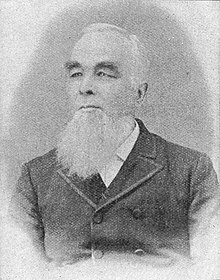William J. White (journalist)
| William J. White | |
|---|---|

White in 1892
|
|
| Born |
December 25, 1831 Ruckersville, Georgia |
| Died | April 17, 1913 (aged 81) Augusta, Georgia |
| Alma mater | Augusta Institute, Simmons College of Kentucky |
| Occupation | Minister, educator, journalist |
| Political party | Republican |
| Religion | Baptist |
William Jefferson White (December 25, 1831 – April 17, 1913) was a civil rights leader, minister, educator, and journalist in Augusta, Georgia. He was the founder of Harmony Baptist Church in Augusta in 1869 as well as other churches. He also was a co-founder of the Augusta Institute in 1867, which would become Morehouse College. He also helped found Atlanta University and was a trustee of both schools. He was a founder in 1880 and the managing editor of the Georgia Baptist, a leading African American newspaper for many years. He was an outspoken civil rights leader.
William Jefferson White was born at Ruckersville, Georgia on December 25, 1831 to Chaney and William White. His father was white and his mother had African-American and Native American ancestors. He could pass for white, but self-identified as black. His mother was a slave, but he never was. He was taught to read by his mother. At the age of seven he started working in a cotton factory, where he worked for three years. He also spent a short time working on a wagon travelling rural parts of the state selling the factory's goods. In June, 1842 he went to Augusta, Georgia where he lived with the family of Captain W. G. Nimms where he learned to write. He then took an apprenticeship as a carpenter for W. H. Goodrich, where he stayed for five years before moving on to cabinet making under C. A. Platt & Co. where he speant two years. He continued this work until 1867. During the American Civil War (1861-1865), the blockade shut out printing supplies to southern printers, and White learned to make printers' wooden furniture, which helped him in his later journalism career. He never formally attended college, but did take part in the courses at the Augusta Institute, which he helped found, and in 1889 was given an honorary Doctor of Divinity by the State University of Kentucky.
During the early period of White's career, he began teaching. In 1853, he opened a secret night school at the home of Samuel Ketch. He started another school at the home of Deacon Anderson Hartwell in 1854, which remained open until the Hartwell family moved to Liberia. After that point, this school was taught on the premises of Judge W. T. Gould without Gould's knowledge. Later in 1854 he opened a third school at the home of Reverend Peter Johnson.
His secular educational career continued after the end of slavery. On January 12, 1867, White was appointed educational agent of the Freedmen's Bureau by Oliver O. Howard, and organized schools for black children in Georgia, He fought against illegal black curfews and helped register blacks to vote. He organized educational societies and worked to obtain land and build schools. White left the Bureau on January 1, 1869 and on May 1 that year was appointed assistant assessor of revenue by Edwin Belcher. He continued to work for the internal revenue service in different roles until January 1, 1880 when he resigned to give his full attention to his religious callings. Also in 1869, he was also chosen trustee of the newly established Atlanta University. White established the Augusta Institute in Springfield Baptist Church in 1867 and served as one of the trustees there as well. White was among those involved in the moving of the Augusta Institute to Atlanta and the change of name to the Atlanta baptist Seminary, and continued to serve on the board of trustees. He was a longtime supporter of Ware High School for blacks in Augusta and was deeply hurt when the Richmond County Board of Education closed the school in 1897 to reapportion money for white elementary education. He was also a co-founder and trustee at the Spelman Seminary which formed in 1882.
...
Wikipedia
